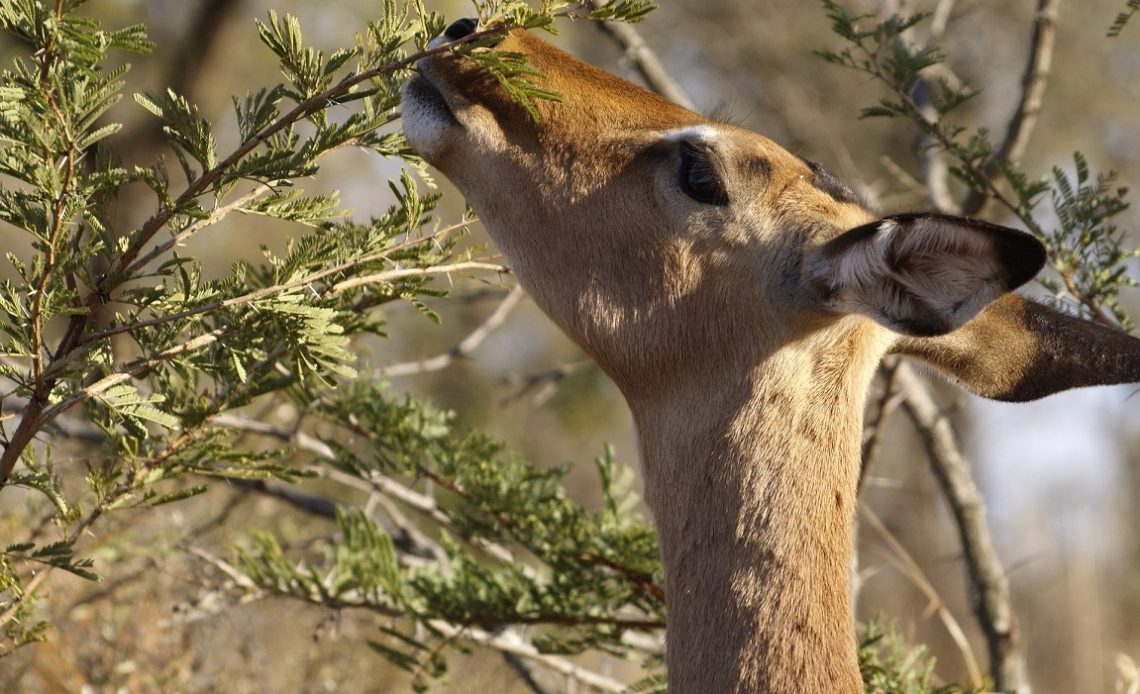

We’re here to help! Wild Yards is a completely free website that is 100% dedicated to helping you create a wildlife-friendly, sustainable yard. Read more
WildYards is reader-supported. When you buy a product through a link on our site, we may earn a comission. Every product is independently selected by our (obsessive) editors and our reviews are unbiased and objective. Read more about our mission or our privacy policy.
Willow trees are among the most beautiful in the world. They have a unique look with strong and outwards facing branches and thin twigs that fall downwards, creating an almost hair-like effect on the trees. Some of us are fortunate to have willow trees in our gardens. However, willow trees are prone to get marked by wild animals – but do deer eat willow trees?
Deer are known to eat willow trees, though it won’t make up their favorite food to forage. Trees deer love include oaks that produce acorns dropping to the forest floor – and those producing fruit. However, if hungry enough, deer will take a nibble at willow for a quick hit of energy and nutrition.
Is willow tree deer resistant?
Although they tend to prefer other trees and plants such as conifers, deer are known to munch on weeping willows as a last resort. They usually turn towards these trees in the winter months, or when there is simply not enough food around.
Mature weeping willows in full bloom can fall down long enough to provide ideal cover for deer when they are eating. Deer prefer to be safe and covered when they eat – so that they are not at risk of predator attacks. Instead, they opt for locations with tall grass, plenty of trees, or even artificial cover to ensure safety while eating.
Generally, however, deer will opt for younger trees. Therefore, the older the willow in your garden, the more likely it will be that it goes untouched.
However, it’s important to ensure you protect willows from deer if you notice regular damage. Damaged willows can develop fungi and disease – therefore, even if local animals aren’t eating the entirety of plants you’d like to keep growing, they could still be shortening their lifespan.
What animals eat willow trees?
The damage caused to your weeping willows is even more likely to be caused by rabbits, porcupines, muskrats, beavers, elk, and black bears. Of course, the animals will vary from state to state, but there may be a combination of them in your garden.
These animals will typically eat their leaves, twigs, seeds, and even the bark when they need to. The same applies to ruminant animals such as deer – but unless you have other deer attracting plants in your yard, or your local deer are running short on their favorite food, it’s more likely an alternative culprit.
Deer normally won’t eat willows as they can get better nutrition elsewhere. The ruminant diet deer adhere to is remarkably complex – and bark from these trees is unlikely to be a major component.
How can I protect my weeping willow from deer?
First, you will need to consider your weeping willow’s age. Of course, if it is just a sapling, it is more vulnerable and therefore more likely to be eaten by wildlife. However, protecting it does not have to be difficult. Simply covering it with some strong wire will help to ensure that no animal can get to it will ensure that your tree can still get the moisture and sun that it needs.
Building a wall or fencing around the tree could help to protect it from certain animals such as deer but it will need to be at least eight feet tall or at least set up in a double perimeter. However, doing so will restrict your views of the tree – and it will not help to keep all animals out (such as squirrels in particular, who will simply climb over).
Therefore, it may be worth planting trees that deer love more at the other end of your yard. Consider oaks for acorns and fruit trees that provide oranges or berries. If deer have an easier digestible food source available in the same yard, they will likely choose that instead.
Of course, you can also choose to grow plants deer tend to avoid to make your yard completely ‘boring’ to them. Consider growing coleus, ferns, and elephant ear plants – and if you have a vegetable patch, grow slightly acidic crops such as cucumber, that are unlikely to entice deer.
Thankfully, weeping willows are relatively strong trees that do not necessarily need much protection. Although you may notice some marks on them from deer and other animals, you can rest easy knowing that mature willows in particular are hardy enough to withstand attacks. Therefore, in many cases, it’s perfectly safe to let nature be!
